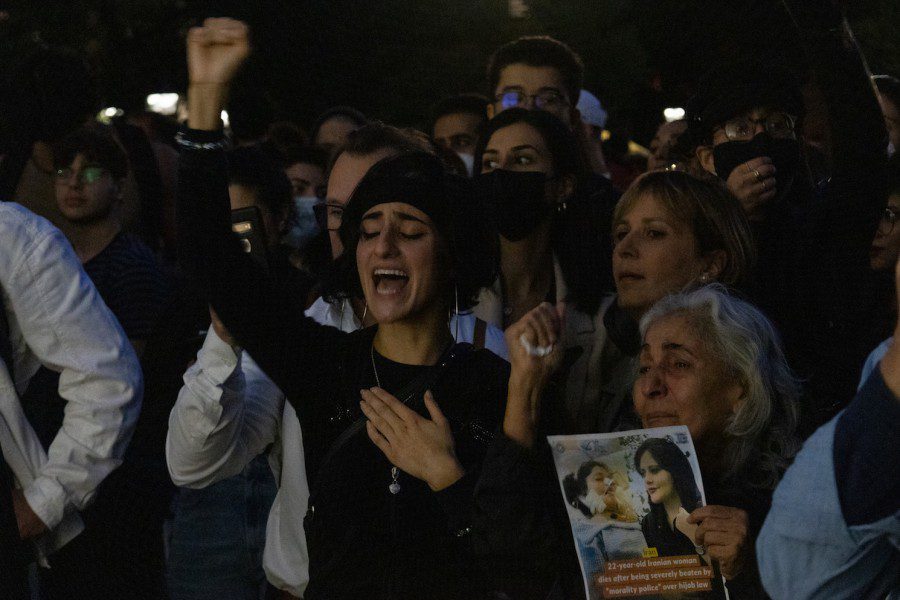Keeping Iranian culture alive at NYU amid protests
Members of NYU’s Iranian community emphasize the importance of preserving their roots and speaking out against injustice.
Attendees at a vigil for Mahsa Amini, an Iranian woman who died during detainment for violating hijab regulations, in Washington Square Park on Sept. 29. (Alex Tey for WSN)
October 24, 2022
Iran, a country in the Middle East with a rich history and vibrant culture, is defined by its welcoming people and love of the arts. We were raised through the poetry of Hafez and Ferdowsi and fed by our grandmothers’ delicious Persian cooking. I am a young Iranian-American woman with a deep appreciation for my culture and the strong women who came before me, the lion women — or the sheer-zanan as my mother always says.
In response to the death of Mahsa Amini, a 22-year-old Iranian woman who died in police detainment after allegedly wearing her hijab improperly, Iranian protests are currently taking place in the streets as women and the younger generation take a stand against the tyrannical regime that has been in power since 1979. Following the Iranian revolution in the late 1970s and the restriction of human rights, many Iranians fled their homeland and settled around the world. However, those who stayed in the country have been fighting back for four decades and now, thanks to social media, are gaining the world’s attention.
Protests in major cities worldwide, including several large rallies in New York City, placed the Iranian diaspora as the subject of many news headlines and social media platforms. Iranians around the world, including at NYU, are now the voices of their brothers and sisters who are censored by their oppressive government in the motherland.
NYU’s Persian Cultural Society connects Iranian students on campus through social events and involvement in New York City’s Persian community. The organization has played an important role in spreading awareness about the current human rights crisis in Iran. PCS held a vigil in Washington Square Park for Amini, and they are currently advocating for the NYU administration to speak up in a document with roughly 200 from university affiliates.
Tara Sabet, a PCS executive board member and LS sophomore, discusses how her love for Persian culture intertwines with the current crisis in Iran.
“When I first got to NYU, it was hard for me to find Iranians,” Sabet said. “I definitely felt a disconnect because Persian culture feels like home and I wanted that here in NYC. Now, everything going on in Iran has made me want to get involved with my community so much more. PCS has given me this space where I can get involved and be with a group of fellow Iranian students all in the same boat.”
In addition to the Persian Cultural Society, the Iranian community at NYU also finds space in CAS professor Yass Alizadeh’s classroom. Alizadeh is a clinical assistant professor and Persian Coordinator in the Department of Middle Eastern and Islamic Studies. She teaches Persian language and literature at NYU and is passionate about the fight for human rights in Iran.
“If we, at NYU, don’t talk about what’s happening in Iran, who is going to talk about it?” Alizadeh said. “There is so much ignorance about the cultures in the Middle East. They don’t know that university dining halls in Iran separate men and women. So one revolutionary thing that these young students have done in the past few weeks is that they sit together and eat.’”
Alizadeh also discusses her definition of Persian culture today and how the diaspora around the world needs to amplify their voices.
“The culture of Iran today is much more than just the beautiful art and music,” Alizadeh said. “It is about what the young people want the culture to be, and they want freedom. Outside of Iran, we have a voice and we have to use it for social justice and equality for our people.”
CAS senior Lily Pourshirazi is a student in Alizadeh’s Intermediate Persian course. She discusses how even after four decades of being outside of their homeland, Iranians around the world make an effort to preserve their culture.
“The diaspora is pretty well connected to their roots, I don’t think I’ve ever met an Iranian-American who didn’t understand or speak Farsi,” Pourshirazi said. “No matter where we are outside of Iran, our families keep the culture going. Persians don’t come to America and then make sure their kids only speak English and give them American names. We have a sense of self-assuredness from that rich, centuries-old culture that I would hate to see fizzle out with this regime.”
The current human rights crisis in Iran is not about new issues — the oppressive regime has been in power for 43 years. As the internet makes the world more connected than ever before, the voices of the Iranian people are finally being heard. This is a turbulent time for the Iranian community, as we are constantly checking our phones for the latest news and trying to get in touch with relatives.
Nonetheless, the diaspora worldwide and here at NYU continues to amplify the voices of the Iranian people and keep the culture alive. No matter where they are, Iranians have always been brave forces for change.
Contact Roksaneh Salartash at [email protected]

























































































































































